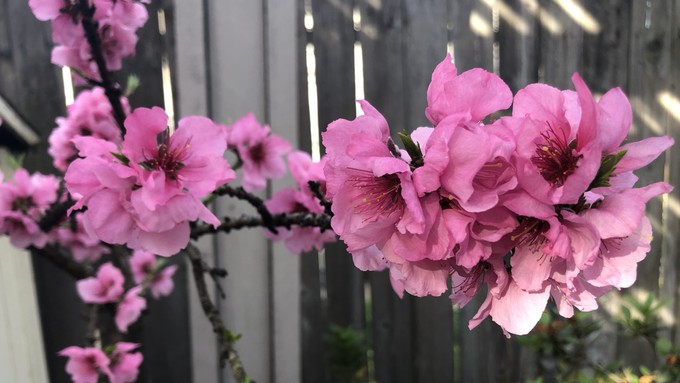
Placer County master gardeners present workshop Saturday

A miniature peach tree wears its spring finery: bright pink blossoms. Kathy Morrison
Dream of having an orchard? Even a small garden can include fruit trees! The Placer County master gardeners will share the details Saturday, Feb. 24, in a free class at the Lincoln Library.
The class will run from 2 p.m. to 3:30 p.m. No pre-registration is required.
"Have you ever wondered what kinds of fruit trees would be best in your garden?" say the organizers. "This class is for you if you are interested in learning the five most important steps that ensure flourishing fruit trees."
-- Selecting the right varieties.
-- Understanding the importance of chill hours.
-- Attracting pollinators for your fruit trees.
-- Successful bare root planting techniques.
-- Ways to increase the variety of your fruit trees.
The Lincoln Library is at 485 Twelve Bridges Road, Lincoln.
For more information on Placer County master gardeners programs and events, visit https://pcmg.ucanr.edu/
Comments
0 comments have been posted.Sacramento Digs Gardening to your inbox.
Food in My Back Yard Series
April 29: What's (already) wrong with my tomato plants?
April 22: Should you stock up on fertilizer? (Yes!)
April 15: Grow culinary herbs in containers
April 8: When to plant summer vegetables
April 1: Don't be fooled by these garden myths
March 25: Fertilizer tips: How to 'feed' your vegetables for healthy growth
March 18: Time to give vegetable seedlings some more space
March 11: Ways to win the fight against weeds
March 4: Potatoes from the garden
Feb. 25: Plant a fruit tree now -- for later
Feb. 18: How to squeeze more food into less space
Feb. 11: When to plant? Consider staggering your transplants
Feb. 4: Starting in seed starting
Sites We Like
Garden Checklist for week of May 4
Enjoy this spring weather – and get gardening!
* Plant, plant, plant! It’s prime planting season in the Sacramento area. Time to set out those tomato transplants along with peppers and eggplants. Pinch off any flowers on new transplants to make them concentrate on establishing roots instead of setting premature fruit.
* Direct-seed melons, cucumbers, summer squash, corn, radishes, pumpkins and annual herbs such as basil.
* Harvest cabbage, lettuce, peas and green onions.
* In the flower garden, direct-seed sunflowers, cosmos, salvia, zinnias, marigolds, celosia and asters. (You also can transplant seedlings for many of the same flowers.)
* Plant dahlia tubers. Other perennials to set out include verbena, coreopsis, coneflower and astilbe.
* Transplant petunias, marigolds and perennial flowers such as astilbe, columbine, coneflowers, coreopsis, dahlias, rudbeckia and verbena.
* Keep an eye out for slugs, snails, earwigs and aphids that want to dine on tender new growth.
* Feed summer bloomers with a balanced fertilizer.
* For continued bloom, cut off spent flowers on roses as well as other flowering plants.
* Add mulch to the garden to maintain moisture. Mulch also cuts down on weeds. But don’t let it mound around the stems or trunks of trees or shrubs. Leave about a 6-inch to 1-foot circle to avoid crown rot or other problems.